
Bill Hillman's EduTech Research Project . The Brandon University Tribute Series Presents |

Bill Hillman's EduTech Research Project . The Brandon University Tribute Series Presents |
DR. ROBERT W. BROCKWAY
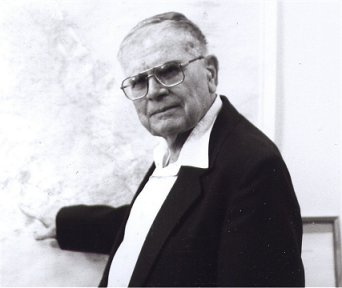
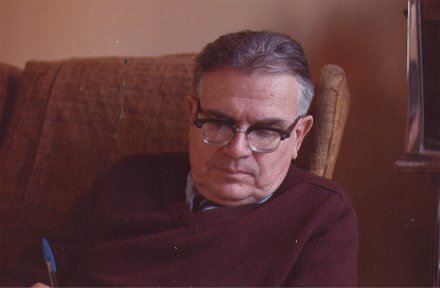
Robert in the classroom and at home in Brandon, 1990s
An Illustrated Biography by Catherine
J. M. Brockway
www.hillmanweb.com/brockway/bio.html
Dr. Robert W. Brockway was born in Washington, D.C., in 1923, the son of a soldier in the American Army Air Corps. His mother traced her roots to a shipbuilding family in Nova Scotia, Canada, but grew up in New England. His father also had a New England background, and was brought up on a not very successful farm, served in World War I, left the service after this war, and took up a variety of activities including riding the rails as an itinerant labourer and working cattle in North Dakota. He finally re-enlisted essentially because he had no better options.
The family was stationed in California for several years after Robert’s birth, then was moved to Hawai’i, where they lived on various army bases until the Pearl Harbor attack. Robert’s father was by then a Master Sergeant in the Army Air Corps., working as ground crew on Hickam Field.
HAWAII
. 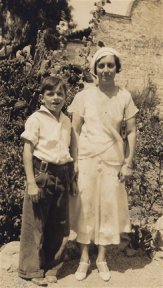
Robert and Mother. 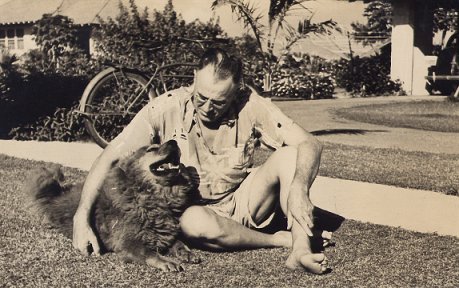
Father and Pal, the chowRobert always identified strongly with the soldiers, and with army life. The peacetime army was an idyllic existence for the families of non-commissioned officers, offering complete security: free medical care, comfortable housing, cheap food at the P.X., entertainment, and soldiers to help with all chores, including packing and moving the household when needed. Robert probably owes his fondness for socialism to these early years.
Robert’s father finished work at the base every day by about 2 P.M., after which he and Robert would go hiking, swimming on the almost empty beaches, or enjoying the amenities of Honolulu. Tourism in Hawai'i before the second world war was limited to those few who could afford the crossing on ships, so soldiers and sailors made up a significant part of the non-native population on Oahu, and the island was still mostly uncrowded and undeveloped. Almost every evening, Robert and his mother and father would gather around the piano, singing song after song. Consequently, all of his life Robert knew hundreds of songs, and could sing for hours, accompanying himself on the piano, which he learned to play by ear, or on the guitar.
A LIFELONG LOVE OF MUSIC ~ ROBERT IN HIS LATER YEARS
. 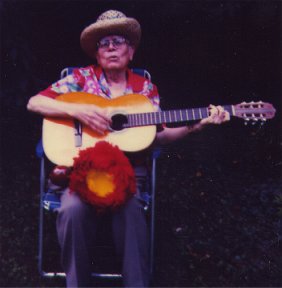
Robert singing Hawaiian songs on Access TV. 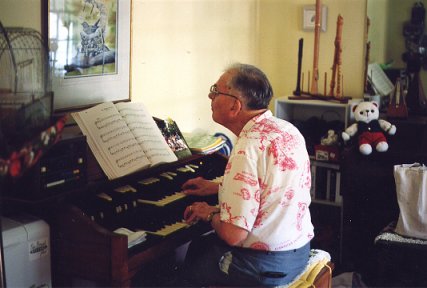
Robert playing the Hammond at home in BrandonNevertheless, Robert's father hated the army, and was frequently in trouble with his superiors, and, as is mentioned in Robert’s diaries of the time, was seriously considering leaving by the time of the Pearl Harbor raid. America’s entry into the war changed his attitude, and Robert remembers his father saying gleefully right after the raid, “I got a war for my birthday!”.
Robert was always interested in history and geography, reading voraciously, although his school grades didn’t always reflect this, as he was prone to “goofing off”. During the war years before the Americans were officially involved, he avidly followed the fortunes of the allies, particularly Great Britain and Holland, donating a dollar a week of his allowance at the British Consulate to the British war effort, and making and keeping up-to-date elaborate maps of the progress of the war in Europe. His anglophilia proved to be a lifelong characteristic.
. 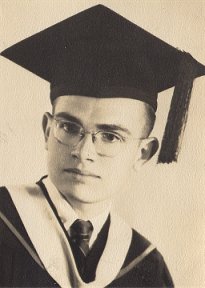
High School Graduation Picture. 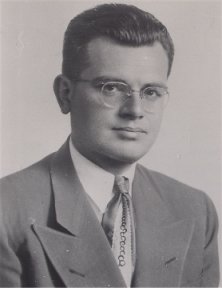
Mid-'40s
He enrolled at the University of Hawai’i in September of 1941, and was destined to flunk his first semester (goofing off again) when he was saved by the post-raid evacuation of service dependents to the mainland; in his case, Washington, D.C. He then enrolled at American University and settled down to his studies while his father was stationed in Great Britain and his mother worked at a clerical job in the Navy Department. (Robert tried to volunteer for the army several times, but was turned down because, as the joke goes, he couldn’t see the wall let alone the eye chart without his glasses.) He earned his BA and his MA (in polynesian studies).
After World War II ended, Robert briefly taught history at Hofstra College in Long Island while finishing his Ph.D at Columbia (in history of religion) and, simultaneously, a Master of Divinity at Union Theological Seminary. He was ordained while serving as minister of the Unitarian Fellowship of Northport (which he founded, the first such fellowship in the denomination), and became interested in a career in the ministry as a result of this experience.
Never a Christian, Robert was nevertheless always fascinated by religion. He often attended a Jewish Reformed synagogue and a Buddhist temple while at university in New York. As a humanist, he was essentially more agnostic than atheist, hopeful, I think, that the promises of religion were not all fairy tales, and very much moved by the beauty of religious language, music, ritual, and architecture.
At this time, he decided to visit Europe, and set off on a converted liberty ship (the Continental) for a lengthy passage to England. On board this ship were the parents of his future wife-to-be, going to Holland to see their relatives who had survived the war. Robert soon gravitated to them, learning Dutch folk songs, and reveling in their “Dutchness”.
. 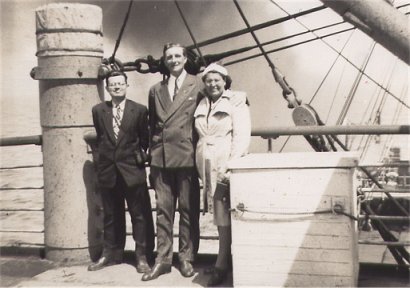
Robert and Katie's parents aboard the Continental - 1948. 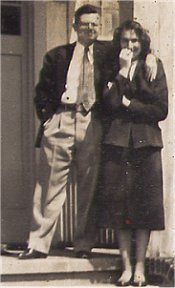
Robert and Katie at NJC circa 1951He was again with them on the return journey, and as so often happens, talked of inviting them to Long Island to meet his parents after the trip (his father had retired there after the war.) Unlike what usually happens to these invitations, he followed through, and Katie, his wife-to-be, at the time beginning her second year at New Jersey College for Women, was dragged unwillingly along with her parents.
So began a long courtship, culminating in marriage in 1952 when Robert after a long struggle with finding either a university position or a church to serve was called to the Universalist Church in Wellesley Fells, Massachusetts. Life in the professional ministry proved very unlike life as the unpaid leader of a fellowship, and Robert was once again drawn to his other love, university teaching, but did not yet want to give up the ministry as a failure. The insanity of the McCarthy witchhunts had made the United States profoundly uncongenial to a pair of social democrats, so, in 1954, he and Katie left the United States to take up the challenge of serving the First Unitarian Church of Hamilton, Ontario, Canada.
After five productive years there, Robert was ready to return to his first love, teaching – the professional ministry was too much involved in fund-raising and organizational squabbles to suit him. However, no jobs in Canada were available at that time. Robert’s love of England led him to take a position teaching in Coventry, first in a secondary modern school (high school) for two hectic weeks which proved to be an unmitigated disaster (the students ran roughshod over him – one student said, “Use the cane, Sir, it’s the only way”), then at Coventry Technical College, somewhat better, but still not leading to what he was hoping for – a university position. In 1961, university jobs began to open up in the States, which by this time had become less inimical, and Robert accepted a position in History at the University of Southwestern Louisiana.
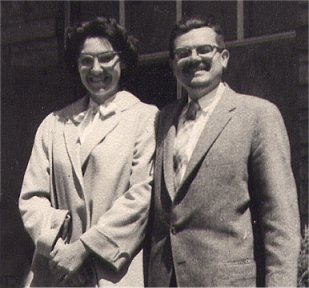
1st Uniterian Church, Hamilton, Ont. |
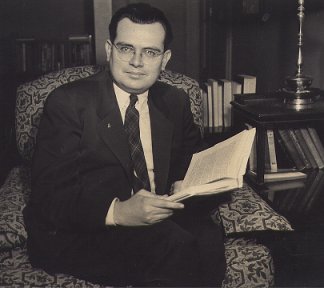
Wellesley Fells, Mass. |
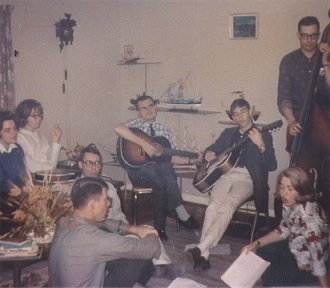
A Hootenany at our house in Lafayette, LA. |
After teaching at the University of Manitoba for two summers while still at USL, Brandon University hired Robert in 1965 to teach, at first, religion, history, AND philosophy, but soon as head of the growing Religion Department. He and Katie settled happily back in Canada, becoming Canadian citizens and giving up U.S.citizenship the next year.
Robert loved introducing new courses, and added such subjects as Witchcraft, the Occult, and Prehistoric Religion. His classes were always packed with students appreciating his inter-disciplinary bent, his open mind, and his encyclopedic knowledge of his subject. He taught at Brandon University until retirement in 1987, and for several years after that as a sessional lecturer, and settled down to his first love, writing, publishing three books, one on Myth, one on Karl Jung, and one on the American Great Awakening (a religious movement).
When Robert became interested in a subject, or introduced a new course, his habit was to sit down and write about it while doing the necessary research. This resulted in numerous published articles on a large variety of subjects, ranging from military history to Walt Disney, and many unpublished manuscripts still in progress when he died. Two books were turned out for his students by the printshop at the university when he couldn’t find appropriate textbooks for them, one for a course in the roots of New Age and one on prehistoric religion. Subjects of the others he was working on included a history of the Army Air Corps. in Hawai'i , a study of the Young Hitler, a history of the Hawaiian Revolution, early aviation in Hawai'i , Judaism in Vienna, Walt Disney, Sigmund Freud, and the Spanish-American War.
In Brandon, he took over the ministerial functions of the just-started Brandon Unitarian Fellowship until its demise, and then continued his ministry with a weekly community access television program called Humanist Alternative for some ten years on which he and his wife, and occasionally others, would engage in a spontaneous discussion on a wide range of topics as seen from a humanist standpoint.
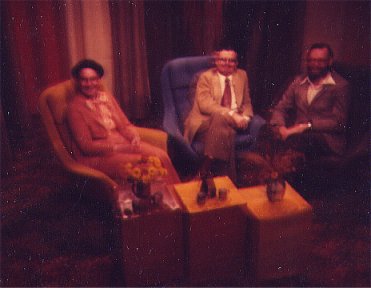
Making "Humanist Alternative" at Access
- with Ken Hanly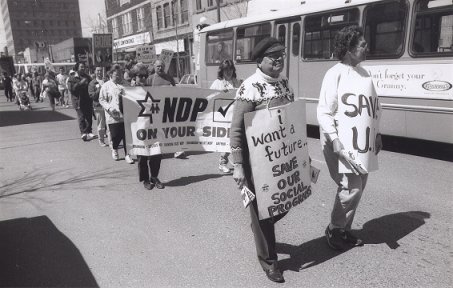
Robert and Katie
leading an NDP march on Rosser Avenue
Robert’s interests were never limited to his major fields of study. He loved painting and drawing; collected toy soldiers; moved into creative writing and ran some groups for this; once wrote an entire novel over a Labour Day weekend for a contest (he didn't win); wrote poetry; started and published for some seven years a quarterly poetry and prose magazine called Pierian Spring with the technical assistance of his wife; travelled extensively almost every year during the summer, sometimes in connection with research projects, sometimes just for fun; worked in every election delivering literature for the NDP; spent every university winter break for years in Disneyland in California, from which he would return clad in Mickey Mouse ears; walked on the picket lines with workers whenever there was a strike and regularly supported labour causes; accompanied his wife to CAMMAC, an amateur music camp in the Laurentians, every summer; and participated in the Brandon Festival of Arts -- reciting dramatic poetry (Kipling was a favorite) and singing some of his huge repertoire of songs. A renaissance man, indeed!
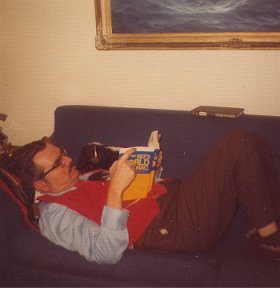
![]()
In the words of a poem dedicated
to him in 1977, by JWG:
Like Zacchaeus
He was a little man
Though he never climbed a tree
Nor laid claim to seeing Jesus
Indeed his proudest boast to friend and foe alike was
I am not a Christian!
He was a walking paradox
Staunch socialist – and fervent royalist
Member of the NDP – yet soul-citizen of the Hapsburg Empire
Believer in free love – yet Victorian in his deepest longing
Counselor and guide to many in their pained bewilderment – but
Like a good physician, unable to heal his own sick psyche . . .
Possessor of ten talents
Yet convinced he had but one . . .
He called himself a HUMANIST
And in the best of that tradition
He was unstinting in his friendship
To troubled students – whom he called
“surrogate children”
To distraught colleagues – who for his kind concern
Elevated him to the doubtful honour of ombudsman . . .
Like Zacchaeus
He was a little man
He never climbed a tree
Yet heard with clarity as in a vision
Humanity’s “still, sad music.”
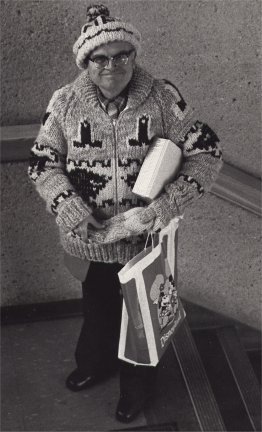
At Brandon University with Disneyland bag
Sweater and toque with NDP and Manitoba logos knitted by wife, Katie
![]()
|
William G. Hillman Assistant Professor ~ Brandon University www.hillmanweb.com/bu/research |
Catherine J. M. Brockway BROCKWAY@BrandonU.CA Copyright 2007 |